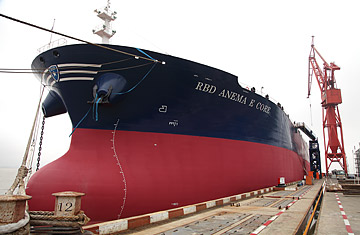
This undated handout picture released on July 26, 2011, by RBD Armatori in Italy shows the RBD Anema e Core Italian tanker, which was seized by pirates with a crew of 23 off Benin in the Gulf of Guinea on July 24
(2 of 2)
Delta activists have railed against oil companies' operating in the region for decades, reacting to hazardous pollution and spills that have rendered entire villages uninhabitable. In August, oil giant Shell admitted to a British court that it was responsible for two spills in the Delta town of Bodo. It was a rare instance of David defeating Goliath — in taking action, Delta villagers face too many financial constraints and the notoriously corrupt Nigerian legal system. Residents of the town of Goi are currently suing Shell in the Hague, where the company has its headquarters, for what they say is negligence that caused a major pipeline to burst near the village in 2004.
But it's the armed attacks, not the legal ones, that have grabbed the attention of regional governments. On Aug. 18, Oyewole Olubenga Leke, Nigerian President Goodluck Jonathan's senior special assistant on maritime services, told Reuters that the coastal states were discussing a joint patrol force that he hoped would be "a real force in the subregion to combat piracy." But with the Gulf countries boasting little manpower and equipment to secure a coastal perimeter that spans 12 countries, it may be too little, too late.
International assistance could be crucial to fighting the scourge. "Countries in West Africa are nowhere close to Somalia, which is a completely failed state with no governance," Wood says. "But there's a question about the capacity of the coast guard and naval forces. There are capacity limitations for long-distance patrolling and area surveillance." The U.S. has provided training to the navies of Nigeria and Cameroon, which has "had a significant impact on criminal activity off those waters," Wood says.
The pirates' increasing boldness is partly a case of follow the leader. "They're being inspired by the earnings of pirates elsewhere in the world," Drake says. But pirates in the oil-soaked West in some ways have it easier than their Somali counterparts: the region is strewn with soft, valuable targets in the form of the oil tankers and refineries that fuel the countries' economies — and are extremely hard to defend. "The key aspect of piracy in West Africa is that, unlike with what we see on the Horn, it's particularly geared towards targeting the offshore oil and gas industry," says Wood. "It's a narrower targeting than what we see in the East in terms of the industry and vessels they choose, and it's not going anywhere anytime soon."
The exploration of oil continues and could deliver the same resource curse upon relatively stable Ghana as it has in Nigeria. Its Jubilee oil field, discovered in 2007, has reserves of 600 million barrels and made its first delivery in December 2010. As more fields are discovered in countries that line the Gulf, they could follow in the footsteps of the Delta villages that have long suffered from the effects of drilling — especially pollution — but see little economic benefit. Poverty is face to face with oil wealth, and local residents are upset they aren't benefiting as well.
Unless West African governments learn to distribute their newfound oil wealth more fairly, experts say, the risk of further piracy will rise. "It will become worse as they find [oil] fields not just in Nigeria but in Ghana and as far north as Senegal," Drake says. "There's going to be people in coastal communities thinking, There are fields — are we going to have access to them?"
